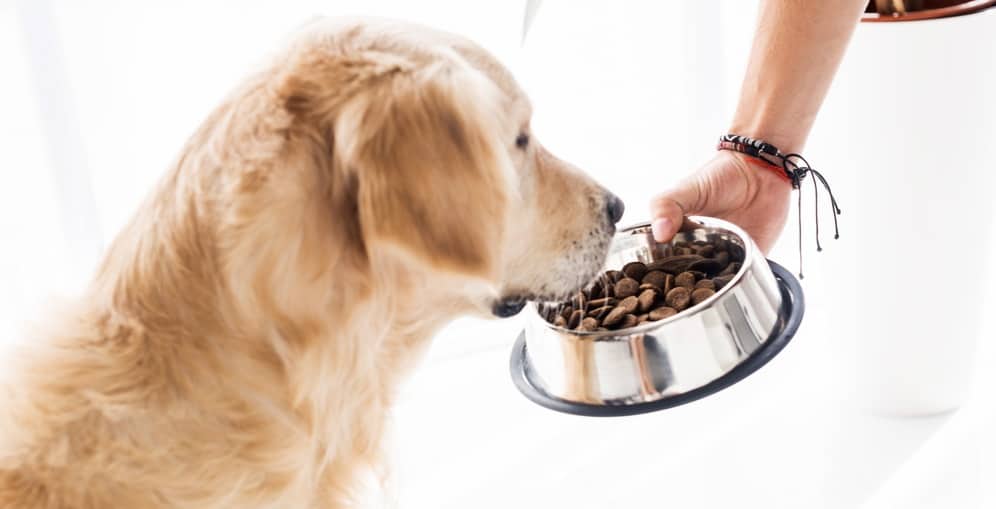Best Dog Food For Sensitive Stomach And Diarrhea And Vomiting And Gas (2019)
No one wants their dog to suffer from digestive issues. Once possible solution for sensitive stomachs is to change to a food made specifically for sensitive stomachs.
But how can you know what is the best dog food for sensitive stomach and diarrhea? Naturally, you will want your dog to get the most relief as quickly as possible.
There are many dog foods on the market that specifically cater to the needs of dogs with stomach concerns. These foods include ingredients that are free from any of the common allergens that dogs face.
Symptoms Of A Sensitive Stomach
How do you know whether your dog is suffering from a sensitive stomach or if he is suffering from an illness? There are several signs that you can look for, but you should have any of these symptoms evaluated by your veterinarian to make sure there aren’t any underlying conditions.
Vomiting
Many dogs eat too quickly and then chug too much water, causing random vomiting, but if your dog is vomiting more frequently and it does not seem related to eating and drinking too quickly, you might need to consider that he has a sensitive stomach.
Vomiting can damage your dog’s teeth, oesophagus, and continually irritate his digestive track. Do not ignore frequent vomiting. Instead, confirm with your vet that he isn’t ill and then buy new food.
Diarrhea
Diarrhea is another symptom that could indicate something is wrong with your dog. It can be harder to catch loose stools if you have a yard that your dog wanders in to go to the bathroom, but the piles are unmistakable.
Diarrhea on rare occasions is nothing to worry about, but persistent bouts of diarrhea can cause dehydration. Once you have confirmed that your dog is in good health, look into best dog food for sensitive stomach and diarrhea that is easier to digest.
Gas
The gas from a dog is unmistakable. If your dog has been detonating sleeper bombs regularly, he might need to have a food change. Even though gas is not as externally problematic as vomiting and diarrhea, it is uncomfortable for both you and your dog.
It is a sign that his stomach is not processing his food well. If you have ever suffered from gas pains, you know what that discomfort is like. Buy your dog the best dog food for sensitive stomach and gas to help him solve the problem.
Why Do Dogs Develop Sensitive Stomach And Diarrhea?

If dogs are all evolved from wolves, why do some have sensitive stomachs and vomiting problems and others do not? Just like humans, every dog is different. Some dogs are more sensitive to allergens than other dogs. Certain dogs cannot digest all of the filler content that is found in a lot of them major food brands.
Some dogs suffer from allergies to certain ingredients as well. Corn is the biggest culprit that can contribute to dog food allergies. Other dogs are allergic to some of the proteins that are found within his food, causing him stomach upset. Food that they cannot digest will come out as diarrhea and gas.
Beyond the physical concerns that can give a dog digestive problems, mental issues can also cause the same symptoms. Dogs that are high strung and full of anxiety are more likely to get themselves riled up to the point of illness. Emotional issues are often not solved through food, however.
Can Dog Food Cause Gas In Dogs?
Actually, the number one cause of disturbing gas for a dog is that he cannot process ingredients in his dog food. Poorly digestible diets cause excessive fermentation within the digestive tract, which results in incredibly stinky gas. When a dog is put on food that he can easily digest, the gas should go away.
Gas can also be caused from a dog eating too quickly and swallowing air at the same time. Air that doesn’t come back up as a burp will follow along the digestive track, coming out as gas.
Normally, it is just an inability to process the food contents, such as too much protein or milk products.
Best Dog Dog Food For Sensitive Stomach & Diarrhea & Vomiting & Gas & Skin
This post contains affiliate links, and I will be compensated if you make a purchase after clicking on my links.
|
Product |
Protein |
Weight |
Rating |
Check Now |
|---|---|---|---|---|
| 1. Wellness Simple Natural
Editor’s Choice |
Salmon |
24 lbs |
100% |
|
| 2. Purina Pro Plan
Budget Friendly |
Salmon |
30 lbs |
98% |
|
| 3. Hill’s Science Diet
For Sensitive Skin |
Chicken |
30 lbs |
99% |
|
| 4. Purina Pro Plan Gastro
Editor’s Choice – (Wet Dog Food) |
Chicken |
13.4 oz |
100% |
|
| 5. Instinct Limited |
Chicken |
25 lbs |
95% |
|
| 6. Wellness Complete
For Gas Problems |
Whitefish |
30 lbs |
99% |
|
| 7. Canidae Pure |
Salmon |
24 lbs |
94% |
Dry vs. Wet Dog Food For Sensitive Stomach & Diarrhea
When it comes to deciding whether to feed your dog wet or dry food, you will need to take several considerations into account. Generally, wet food is a better choice for dogs that have a sensitive stomach or are experiencing diarrhea.
This is because wet dog food does not contain the same amount of carbs nor does it have the preservatives that dry food has. Since a lot of dogs with sensitive stomachs and vomiting have reactions to certain ingredients that are found in dry food, wet food is likely to be easier on their stomachs.
That said, keep in mind that wet food is normally higher in calories and not as food on your dog’s teeth.
1. Wellness Simple Natural Dog Food
Best Dog Food For Sensitive Stomach And Diarrhea
Wellness Simple Natural Limited Ingredient Dry Dog Food is a plant-based dog food for sensitive stomach that comes in a variety of six recipes, four of which are grain free and two which are not. The range is specifically designed for dogs with sensitive stomachs. The one under review is the salmon and potato recipe.
The main ingredients are the single source protein, salmon and salmon meal
Salmon is a lean, easily digestible source of protein that is also rich in Omega-3 fatty acids and other nutrients. Salmon meal is considered a protein concentrate and as such has 300% more protein than the principal ingredient, salmon.
The next main ingredient is potato
Although potato has very little nutritional value as food for dogs, it is a source of a gluten-free carbohydrates and shouldn’t upset sensitive stomachs.
The fourth ingredient is peas
Peas are high in natural fibre, are a quality source of carbohydrates, and have 25% protein content. Don’t forget that this will affect the overall protein content of this recipe.
Dried ground potato, the fifth ingredient, is a by-product of processing potatoes and adds approximately 10% dry matter protein to the total protein content.
Tomato pomace is rather a controversial ingredient. It is the by-product of tomato processing, and some consider it a rich source of nutrients, while others maintain it is merely a filler. However, the content is so minimal that it doesn’t really make any difference either way.
Flaxseed is the seventh ingredient and is a superlative source of plant-derived omega-3 fatty acids. Flaxseeds are also an excellent source of soluble fibre. As flaxseed also contains 19% protein it will affect the total protein content of this dog food. Together with the ground flaxseed is canola oil which is also a very good source of Omega-3 fatty acids.
Vitamins: Wellness Simple Natural Limited Ingredient Dry Dog Food is rich in vitamins A, B-12, C, D-3 and E as well as the minerals Zinc Proteinate, Zinc Sulfate, Iron Proteinate, Ferrous Sulfate, Copper Sulfate, Copper Proteinate, Manganese Proteinate, Manganese Sulfate, Sodium Selenite and Calcium Iodate.
Probiotics: This recipe also contains pre-and-probiotics to assist in the maintenance of the intestinal flora essential as an aid to any dog’s digestion.
Grain -Free: Wellness Simple Natural Limited Ingredient Dry Dog Food is a completely grain-free dog food with no wheat, soya or corn, and with no meat by-products or eggs, artificial preservatives, flavours or colouring.
Conclusion
This recipe has an average protein content of around 20% and fat at 12%, which implies a carbohydrate content of approximately 58 – 60%. Its use of moderate amounts of single source quality protein and a recipe specifically designed for dogs with a sensitive stomach, make this one of the best dog food for sensitive stomach vomiting.
Pros
- Reasonably priced
- Added vitamins and minerals
- Added pre and probiotics
- Does not contain wheat, gluten or grains
- The chief ingredient is high-quality salmon
Cons
- None come to mind
2. Purina Pro Plan Focus
Best Dog Food For Sensitive Stomach And Skin (Budget Friendly)
This is a great food choice for your favourite dog because it works well within a budget. The Purina Pro Plan Focus is a formula that is specific to dogs with sensitive stomachs. While this is not a breed specific food, it is focused on digestive health for any dog that eats it.
The primary ingredient of this food is salmon, followed by barley, rice, canola meal, oat meal, and fish meal. The salmon in this food is incredibly easy to digest for any dog and it is also a natural course of glucosamine. Glucosamine is essential in maintaining your dog’s bone and joint health. While this is more geared toward larger dogs, glucosamine can help dogs of any age and size.
Purina Pro Plan has a lot of minerals built into the food:
- Vitamin E
- Vitamin B-3
- Vitamin B-5
- Vitamin B-6
- Vitamin B-1
- Vitamin B-12
- Calcium phosphate
All of these vitamins and minerals add up to create a food that will work well for your dog, regardless of your dog’s breed. Even when you don’t have any puppies, you will still need to consider the ratio of food to water.
Fats-wise, the Purina Pro Plan has animal fats, sunflower oil, and fish oil. The fish oil itself is full of Omega-3 fatty acids as well as DHA, both of which can help with eyes and brains, but they also help to soothe any kind of uncomfortable skin issue that your dog might be suffering from, helping smooth the coat down.
The food does contain some animal fillers, which can cause some sensitivity by allergen exposure. If you know that your dog is sensitive to any of the ingredients that we have listed, this might not be the best food choice for him. Otherwise, you should be able to try this food when allergies are not a concern.
Pros
- Formulated specifically for the needs of sensitive stomachs
- Salmon is the first ingredient
- Contains lots of healthy oils
- Contains glucosamine for healthy joint development
- Helps maintain digestive regularity.
Cons
- Does contain some fillers
3. Hill’s Science Diet Dog Food
High Quality Dog Food For Sensitive Stomach And Skin
This recipe has been specifically designed for adult dogs with sensitive stomachs and/or sensitive skin.
Protein source
The two main ingredients are Brewers rice and chicken meal. Brewers rice is a by-product of cereal grain and is considered nothing more than cheap filler as it has very little nutritional value. Chicken meal is made from the rendering of the chicken parts left over after the slaughtering process, and as a protein concentrate has 300% more protein than the original dry ingredient.
Sorghum
This third ingredient, has many of the same characteristics as corn but is gluten-free and is therefore considered preferable to corn. Sorghum also boasts better blood sugar behaviour and as such is an acceptable non-meat ingredient.
Pea protein
This is an excellent source of plant protein and is high in natural fibre. It also has a 25% protein content, which will affect the overall protein content.
Cracked pearl barley is the fourth ingredient. It is a good source of high-quality dietary fibre and other nutrients.
Pork fat is produced by rendering pig meat. It adds considerable flavour to any dog food and is high in omega-6 fatty acids. Provided it is added in moderate amounts; it is a very acceptable pet food ingredient.
The beet debate: One of the controversial ingredients in this recipe is beet pulp, which is the residue of sugar beet processing. It is high in fibre and has blood sugar benefits, but is considered by some to be inexpensive filler.
Soybean oil could be an issue: It has been linked to allergies in dogs and as such might be suspect as an ingredient, but it is rich in omega-6 fatty acids, but not omega-3 fatty acids. Therefore, it is not considered as good as flaxseed oil as an ingredient. Flaxseed is an ingredient that is rich in omega-3 fatty acids and soluble fibre.
The balance: The protein content of this recipe is approximately 24% with a fat content of about 14%, which leaves carbohydrate content at about 55%. Overall, it has a moderate protein and fat content, and above average carbohydrates. Maybe the moderate amount of meat is good for sensitive stomachs, and if the recommendations are anything to go by, it is one of the best foods for sensitive stomachs.
Extras: With added vitamins and minerals, as well as fresh vegetables such as broccoli, carrots and cranberries, and added oat fibre this recipe is a plant-based dog food for sensitive stomach with a moderate amount of meat.
Pros
- Reasonably priced
- Moderate meat content
- Added vitamins and minerals for both stomach and skin care.
- No artificial colourants and flavours and no preservatives
Cons
- High carbohydrate content
4. Purina Pro Plan Gastroenteric Formula
Best Wet Dog Food For Sensitive Stomach & Diarrhea
Our choice for the best wet dog food for sensitive stomach is the Purina Pro Plan that is made specifically for sensitive stomach-vomiting problems.
The first ingredient in this food is meat by-products, supplying your dog with a reliable amount of protein. Because this is a wet food, the second ingredient in this food is water, which actually makes up for about 75% of the food. Water and moisture dilutes the food to make it easier for your dog to process.
Vitamins and Minerals
You will find that this food is full of good vitamins and minerals that dogs that have trouble with digestion really need. These include:
- Calcium
- Phosphorus
- Vitamin B12
- Vitamin E
- Vitamin D3
- Vitamin A
There are many other minerals within this food as well. If your dog suffers from IBS, gastritis, or enteritis, there is a good chance that he is not getting all of the nutrition that he needs to be healthy. The loss of nutrition can not only affect his weight, but it will also affect how he feels as well as his bones and joints.
Stomach Focused
Purina Pro is also formulated with the needs of dogs that have stomach problems. This formula includes probiotics, which are so important for the maintenance of gut flora. The food is also low in fibre, which is a source of gastric upset as well. If your dog’s stomach does not have to break down fibres, then he is less likely to suffer from gas and other stomach upset. This food also has a great amount of protein which also helps support intestinal health.
Pros
- Low carbohydrates
- Made for dogs that have gastritis and enteritis
- Low in fat
- Offers balanced nutrition
- Low fibre for intestinal support
Cons
- Does have soy protein
5. Instinct Limited Ingredient Diet Grain Free
Protein source
The principal ingredient of this particular dog food for sensitive stomach from Instinct is turkey meal. Turkey meal is made by rendering the leftovers of the slaughtering process, and as such is considered a meat concentrate that has 300% more protein than the original ingredient.
Carbs
Next on the ingredient list is tapioca, a gluten-free carbohydrate extracted from the root of the cassava plant.
Fats
The third ingredient is Canola oil which is an excellent source of essential omega-3 fatty acids. There is some controversy around canola oil as it could be derived from genetically-modified rapeseed.
Peas are a plus: The next ingredient is peas. Peas have a protein content of about 25% and are also a valuable source of natural fibre. They are considered a high-quality nutritional addition to any dog food.
Health food added: Two interesting additions to this recipe are montmorillonite clay and coconut oil. Montmorillonite clay is an organic source of many essential trace elements and has been approved by the US Dept. of Agriculture for use in organically certified products. Coconut oil is an organic oil rich in medium chain fatty acids.
Medium chain fatty acids have been found to help in maintaining cognitive ability in older dogs, and have been used in the treatment of canine cognitive dysfunction syndrome (CDS) and chronic skin disorders.
There is a unique green tea coating on the kibble which increases flavour.
Nutritional balance: The protein content is 28%, the fat content is 18%, and the carbohydrate content is 46%. This recipe has average protein, above average fat, and below average carbohydrates.
This recipe, and others in the Instinct range are specifically formulated for dogs with sensitive stomachs, with only one animal protein, and a few other essential ingredients. They have no grain, dairy, gluten, eggs, potato, chicken or beef.
Pros
- Above average dog food
- The addition of coconut oil to help in improving cognitive ability in older dogs.
- Limited ingredients for animals with food sensitivities
- Added vitamins and minerals
Cons
- No probiotics
6. Wellness Complete Health Natural
Best Dog Food For Sensitive Stomach And Gas
Protein source
The main sources of protein in this dog food for sensitive stomach, ingredients one and four, are whitefish and fish meal. Fish protein is an excellent source of easily digestible, first class animal protein which is also rich in essential fatty acids. The fish meal, produced as a by-product of fish preparation, is a concentrated protein source with up to 300% more protein than the fish from which it is made. The fish also adds an excellent taste to the dog food.
Carbs
The second ingredient is de-hulled ground barley. Barley is a carbohydrate that supplies fibre and other nutrients. It is a valuable source of energy for your dog but is of little nutritional value.
The sixth ingredient is sweet potato which is a quality gluten-free carbohydrate.
Fats
The next main ingredient is canola oil. Although there is some controversy around canola oil, due to the fact that it might originate from genetically modified rapeseed, canola oil is considered an excellent source of essential omega-3 fatty acids.
Tomato Pomace and Flax seed
The next two ingredients are tomato pomace and ground flaxseed. Ground flaxseed is another superlative source of plant derived omega-3 fatty acids and soluble fibre. However, dogs digest animal derived omega-3 fatty acids easier than plant-derived fatty acids.
Tomato pomace is a by-product of tomato processing and is another rather controversial ingredient. Some experts maintain that it is rich in essential nutrients, while others maintain that it is merely inexpensive filler. Its place in the list of ingredients means that there is very little of the ingredient in the recipe, and as such, can do little harm.
Vitamins and minerals
The rest of the ingredients are added vitamins (A, B-12, C D and E), as well as minerals such as Zinc Proteinate, Zinc Sulfate, Iron Proteinate, Ferrous Sulfate, Copper Sulfate, Copper Proteinate, Manganese Proteinate, Manganese Sulfate, Sodium Selenite, Calcium Iodate. Another interesting ingredient is green tea extract which is an excellent flavour enhancer.
Nutritional balance
This recipe has a protein content of 22% and a fat content of 12%. This recipe has below average protein and fat and average carbohydrate content when compared to other similar dog foods.
This dog food for sensitive stomach comprises of a few essential ingredients with no extra fillers, and as such is an excellent dog food for dogs with food sensitivities. The single source of high-quality protein ensures that your dog has the necessary nutrients for muscle growth and the high-quality carbohydrates ensure that your dog has plenty of energy.
Conclusion
There is no wheat, corn or soya in Wellness Complete Health Natural Dry Dog Food, no artificial flavours and colouring, and no preservatives. The omega-3 and omega-6 fatty acids help to maintain a healthy skin and shiny coat.
All in all, this is an above average dog food for sensitive stomach, if somewhat pricey.
Pros
- No corn, soya or wheat which is difficult for dogs to digest.
- No artificial flavours, colouring or preservatives.
- Made in USA (no ingredients from China).
- Limited ingredients for dogs with sensitive stomachs. Some customer reviews consider this recipe to be practically miraculous for dogs with extremely sensitive stomachs.
Cons
- We didn’t find any.
7. CANIDAE Grain Free PURE
Protein source
As with a great number of dog food recipes for dogs with sensitive stomach, this recipe relies on a single source animal protein, in this case, fish (salmon) and fish meal (Menhaden and salmon).
Menhaden are small mid-level fish that are rich in protein and omega-3 fatty acids and are unlikely to have mercury contamination, which is not the case with larger deeper level fish. The Menhaden and salmon fish meal is obtained from the ground tissue of clean, dried and undecomposed fish cuttings left over from commercial fishing operations.
The salmon is not only a source of quality animal protein but also an excellent source of essential fatty acids. The fish meal is concentrated and contains 300% more protein than the original fish.
Carbs
Sweet potato, peas, and potato are the principal sources of carbohydrates in this recipe. Peas are a legume which is a source of quality carbohydrates and natural fibre, and contains approximately 25% protein, which might skew the calculation of the protein content of the dog food for sensitive stomach.
Sweet potato is a quality carbohydrate source, and potato is considered a good source of digestible carbohydrate. Together these three ingredients guarantee that your dog’s energy requirements are met adequately.
Fats
Canola oil, another of the ingredients, is considered an excellent source of omega-3 fatty acids, but there is some concern that the canola oil might be sourced from genetically modified rapeseed.
Unusual extra
Alfalfa is related to hay, and it is unusual to find this ingredient in dog food as it is normally used in horse feeds. However, it is still considered to be a good source of fibre and contains 18% plant-based protein, which again could skew the protein content calculation.
Vitamins and minerals
This recipe has added vitamins (A, B12, C, D, and E) and minerals such as iron proteinate, zinc proteinate, copper proteinate, ferrous sulfate, zinc sulfate, copper sulfate, potassium iodide, manganese proteinate, manganous oxide, manganese sulfate, sodium selenite.
Probiotics
This formula also has numerous fermentation products like dried lactobacillus casei, which supply pre-and-probiotics that ensure adequate intestinal flora to aid your dog’s digestion.
Conclusion
This limited ingredient dog food is excellent for dogs with food sensitivities, as it uses a single source protein (fish) and carbohydrates that easily digestible. There are no allergic-triggering ingredients and no corn, wheat or soya. There are also no unnecessary fillers and no artificial ingredients.
Protein content is at 23% and fat at 12% with carbohydrate content at 55%. This equates to below average protein and fat content, and average carbohydrate content. It is recommended as a limited ingredient dog specifically formulated for dogs with food sensitivities.
Pros
- Limited ingredients for dogs with food sensitivities.
- Live probiotic to aid digestion
- Added vitamins and minerals
- Omega-3 and omega-6 fatty acids for a healthy coat and shiny skin.
- No wheat, soya or corn.
- No artificial ingredients.
Cons
- Not budget friendly
A sensitive stomach is common amongst a lot of dog breeds, and specific to certain breeds such as Scotch Terriers and Yorkies. There are numerous causes of sensitive stomach ailments in dogs. These could include: change in diet, incorrect diet, eating something out of the trash can, and even internal organ damage.
If your dog’s problem is diet-related, you can solve it by buying the best dog food for sensitive stomach and diarrhea. Limiting your dog’s access to the garbage and other undesirable sources of questionable food will sort out most of the second category.
If, however, your dog has been vomiting and has been exhibiting signs of diarrhea for a number of days, it is not just diet that’s at fault. My suggestion would be to visit the vet to have your dog thoroughly examined immediately.
Possible Causes of Sensitive Stomach
- Tapeworms, roundworms, and other parasites.
- Bacterial Infection
- Eating mouldy trash could have caused a fungal infection
- Eating a poison or a foreign object
- Stomach Ulcers
- Pancreatitis caused by eating table scraps and other fatty food
- Irritable Bowel Disease
- Eating too fast or gulping while eating
- Change of Diet
- Unsuitable diet
- Food Allergies
The first eight of these possible causes could be potentially very serious. If you suspect that the cause of your dog’s indigestion is a little more serious than wrong dog food for sensitive stomach, or if you have a combination of symptoms, consult your vet immediately.
He will take a sample of your dog’s stool, and a blood sample, and possibly, call for X-rays. The vet will then be able to tell you exactly what is wrong with your dog and suggest remedies, be they medical or surgical.
Allergies and Diet
If your dog’s sensitive stomach is as a result of the last two causes, then you can do something about it yourself. The very least you can do is to experiment with various best dog foods for sensitive stomach (and there are many of them on the market) until your dog lets you know that he is happy with that particular recipe.
If your dog only vomits or has diarrhea occasionally, try putting it on a diet of boiled rice and chicken for a few days. You can also feed your dog pumpkin, which is good for diarrhea, or yoghurt. Yoghurt supplies much needed stomach flora that can assist in your dog’s digestion, particularly after an illness.
Apart from food intolerance, your dog might have an allergy. Many breeds are allergic, in varying degrees, to grains such as wheat and corn which are often found in dog food. Generally, the cheaper the sensitive stomach dog food, the higher the grain content. Some dogs are allergic to a particular protein source found in certain dog foods. Try switching to a different protein source, which you can often do within the same brand.
Tips On How To Switch To Sensitive Stomach Dog Food

Switching dog foods can cause an upset tummy, even when you’ve chosen a very good food. Use these tips to implement the change gently.
- Take your time: It should take at least a week to switch slowly from one dog food to what you think is the best dog food for sensitive stomach and gas. Start by mixing in a small amount of the new dog food. Every day slowly increase the amount of new sensitive stomach dog food you add, until your dog is eating the new food exclusively by the end of the week.
- Avoid known allergens: Try and make sure that the dog food for sensitive stomach you choose doesn’t have too high a proportion of the ingredients known to cause sensitive stomachs in dogs.
- No table scraps: Avoid human food and treats for at least five weeks, while you make the transition to the new food. Don’t forget; it takes at least three months for a new diet change to take effect.
Tips On How To Read Dog Food Labels
Before reviewing the best dog food for sensitive stomach and diarrhea brands chosen, something should be said on how to read the list of ingredients on dog food packaging, and the importance and significance of all these rather esoteric ingredients.
- The list of ingredients on the packet of dog food for sensitive stomach is arranged in descending order by amount. The first on the list should be a protein, as all dogs require a reasonable amount of protein. However, if the next few ingredients are all grain, you might end up with more grain than protein.
- Dogs find it difficult to digest grain so beware of recipes that contain a lot of grain.
- The protein should be a specified meat such as lamb, beef, turkey, and not just “meat,” which could be anything.
- Premium, natural and organic cannot be qualified or compared. Do your research if you are really sceptical.
- The manufacturer only has to specify chemical flavourings and preservatives if he has added them himself. If the manufacturer uses ingredients that already have additives and preservatives, that manufacturer is under no obligation to list this. Whatever the case, be aware of additives and preservatives on labels, they have been known to cause allergic reactions in dogs.
- If the packaging says “AAFCO (Association of American Feed Control Officials) confirms…” it means that the dog food for sensitive stomach has been tested to ensure that the nutritional needs of the dog are met, irrespective of their stage of development.
- Beware of preposterous claims such as “teeth cleaning formula” or “Lite or Diet formula.” Diet or Lite merely means the manufacturer has used more grain in their recipe; and as for teeth cleaning, most dogs don’t chew.
- If the manufacturer changes their formula, they have six months before they are compelled to change their packaging. If your dog develops food insensitivity, and you haven’t changed your brand of dog food, the manufacturer has probably changed the formula.
Finding the best dog food for sensitive stomach and skin can be quite a challenge.
Symptoms to Watch Out For
- Diarrhea: A change in diet, or not enough of the correct fibre, can cause a loose stool.
- Vomiting: It is not unusual for dogs to vomit occasionally, but if the vomiting is accompanied by a lack of energy and diarrhea, then it is advisable that you consult a vet.
- Gas: Dogs sometimes eat too fast, just like humans, and certain breeds gulp air when they eat. If the amount of gas seems to you too excessive, it may be because of his diet. If switching to the sensitive stomach food lowers the amount of gas, you have found, and solved, the cause of your dog’s discomfort.
- Eating Grass: Dogs instinctively know that grass is a natural remedy for an upset stomach. The grass tickles their stomachs, and they vomit as a result. If your dog constantly eats grass, it might be his way of telling you that something is wrong.
How to Know That Your Dog Has Sensitive Stomach
Like small babies, dogs cannot tell you what ails them; if you love your dog, intuitively, you just know that something is wrong.
Things to Look Out For
- Lethargy is one of the first signs that something is wrong. It can be a sign of an upset tummy, but it could also be the first symptom of something more serious. See the vet.
- The second is loss of appetite. Dogs love food, so if your dog is avoiding eating or eating a lot less than they normally do, the dog food might be causing them pain.
- Vomiting. Sometimes dogs have a love for an odd substance that causes vomiting, and sometimes they eat grass, which will cause them to vomit. If the vomiting persists, it might very well be a sign that the dog food you are using doesn’t agree with your dog. If that’s the case, start looking for the best dog food for sensitive stomach and gas problems.
- Diarrhea: If your dog tends to make loose stools, the food could be to blame.
- Dehydration. Your dog might be dehydrated. There are two very simple tests you can do to help you to ascertain whether your dog is dehydrated. If he is, he should see the vet.
- If you pull back the dog’s upper lip, their gums should be coated with a wet film. If it’s dry, there is a good chance your dog is dehydrated.
- Take your dog’s skin over their neck as if you were the dog’s mother, and were about to pick the dog up in your teeth. Release the skin. If it stays peaked and doesn’t return to its normal position, your dog might be dehydrated.
- Excessive Gas. All dogs pass gas, just like humans, but if it appears excessive and continuous, your dog might have sensitive stomach which is probably caused by incorrect diet.
If you make changes to their diet and the symptoms still persist, you might be facing a more serious problem. The first thing to do if you suspect that something is wrong is to visit your vet and get your dog thoroughly examined. The vet will be able to identify or rule out any serious internal causes for what ails your dog.
Ingredients That Best Dog Food For Sensitive Stomach And Gas Should Have
All dogs, even dogs with sensitive stomachs, have to receive certain nutrients in certain proportions for normal, healthy growth and maintenance. These requirements will also vary at different stages throughout the dog’s life. You don’t feed an aging dog what you would feed a puppy.
Here Are A Few Dog Food Ingredients That Indicate A Good Choice For Sensitive Stomachs:
- Protein should be high quality specified protein from a reliable source such as chicken, beef, lamb, salmon,, and should be the first ingredient on the list of ingredients on the packet.
- Fat is obtained by rendering animal fat and should not be above average content.
- Carbohydrates. Preferably, carbohydrates should be from a high-quality vegetable source such as sweet potato and peas. The formula should not have too much grain as dogs sometimes find it difficult to digest corn, wheat or soya.
Limited ingredients list: The first important consideration is not too many ingredients in the dog food, what the trade calls “limited ingredient” dog food. Ideally, the best dog food for sensitive stomachs and diarrhea should have one protein and one high-quality vegetable carbohydrate such as sweet potato.
Watch out for grain-based ingredients: The best dog food for sensitive stomachs and skin should not have two much grain such as wheat, corn, etc., and there shouldn’t be more grain than protein.
Vitamins and Minerals: The better sensitive stomach dog food should have all the necessary added vitamins and minerals to ensure adequate nutrition for your dog.
Probiotics: Dog food for sensitive stomachs should have adequate probiotics to ensure adequate stomach flora for the proper maintenance of intestinal health.
Fats: Dog food for sensitive stomachs should have adequate amounts of essential omega-3 and omega-6 fatty acids. Fatty acids are essential for maintaining healthy skin and a shiny coat. Dogs find it easier to obtain fatty acids from animal based sources as opposed to plant based sources. Good sources of fatty acids are fish, rendered animal fat, flaxseed and canola oil.
Certified and balanced: Sensitive stomach dog food should be complete and balanced. This generally means that the dog food has been specifically formulated to provide all the nutrients a dog needs for optimum health. If your current dog food causes sensitive stomach, it could mean that your dog is not getting all the necessary nutrients.
Ingredients Dogs With Sensitive Stomachs And Gas Problems Should Avoid
As we’ve discussed, all dogs need all nutrients in correct proportions. Therefore, dog food should reflect those essential needs.
Check the source of the protein
If the description is some kind of generic by-product meat meal, beware. You don’t know where the meat comes from, and it could be and has been known to be, from highly suspicious sources. We have heard of foods containing slaughterhouse waste, diseased farm animals, spoilt food, roadkill and dead zoo animals as well as euthanized cats and dogs. Be careful; the protein source must be specified and reliable.
Avoid grains and fillers
Generally, cheaper dog food for sensitive stomach contain a higher proportion of grain, than the better-priced, higher quality sensitive stomach dog foods. Do your research, and read the labels. Dogs find it very difficult to digest grains, and this is particularly so for dogs with sensitive stomachs. So avoid dog foods that have a high proportion of corn, wheat or soya.
Some sensitive stomach dog foods use a lot of “filler” to up the calorie count and add weight. High proportions of grain, tomato pomace, and beet pulp should be avoided. Don’t forget, the higher up the list of ingredients it is, the more that ingredient is proportionately.
Known allergens
Avoid dog foods that contain ingredients that are known to cause an allergic reaction, like dairy and eggs.
Artificial additives
Avoid dog foods that contain artificial flavours and colouring, and preservatives. These are known to have caused allergic reactions in a lot of dogs from many different breeds.
Origins
Beware of dog food for sensitive stomach that is not made in the USA or Canada. Avoid dog foods made in China and Mexico, as these two countries are known to have been the source of contaminated dog food.
A great deal of the production of cheaper dog foods is outsourced to countries like China and Mexico. These countries don’t have as efficient a system of controls as we do in the US. Therefore, you don’t know what’s in the dog food. There have been cases, requiring major product recalls, where toxic chemicals have been found in outsourced dog food.
Although the following cannot be classified as dog food ingredients, I feel it incumbent on me to mention a few tips that I think are necessary for your dog to avoid sensitive stomach issues.
- Avoid giving your dog table scraps. I know it’s difficult to resist those pleading eyes, but dogs with sensitive stomachs should not be given rich, fatty table scraps.
- Avoid chocolate, tea, coffee, raisins, nutmeg and onions. They have all been known to be detrimental to dogs.
- Don’t let your dog root in trashcans and other questionable sites, or eat spoiled food.
- Don’t chop and change his diet too quickly. It should take at least a week to change from one to the other and 3 months for the true effect to be felt.
Final Words
Dogs are like humans in that all dogs get an upset stomach at some stage or another. It is to be expected. However, if your dog consistently has an upset stomach you have to start investigating the reason why.
A trip to the vet will either identify or quickly rule out parasites and serious internal problems. If those are not the causes, the only thing left is diet, and you have to begin the arduous process of trying to determine what is causing the upset stomach and how to correct it.
It is no easy task to work through various combinations of dog food to eventually hit on the right one. Luckily, most of the more reputable brands have various combinations of protein and starch that are good for sensitive stomachs.
So, if salmon and potato don’t work, you can try lamb and barley, for instance. If nothing from that brand works, you can switch to another brand, and repeat the process. With perseverance, you will eventually hit on the right formula that will keep your dog happy and healthy.
Following the guidelines I have outlined above, I’m sure you will find the task a little easier. You know what to look out for now, so go and do your research.
The six dog foods we have reviewed are considered to be some of the best dog foods for sensitive stomachs, so they provide a very good starting point. Try and choose a high-quality dog food that is balanced, complete, and with limited ingredients. Don’t forget, dogs find it difficult to digest food with low-quality ingredients.








